18 November 2023
Posted by Claire Hillier
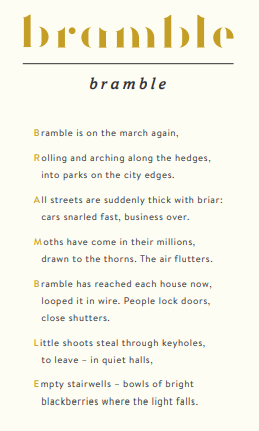
Junior Writers - week 3 - Nature Writing [trees/plants/flowers]
Welcome,
We started with our group check in, describing our week so far as a plant/tree/flower - what would it be, and why?
Claire - Ivy, climbing everywhere
Lyla - a Monkey Puzzle Tree, lots of branches
Hamish - a Rhododendron, many flowers
Marissa - Bamboo, spread quickly
Indy - a Coconut Palm Tree, days falling quickly
Followed by a round up of what we are reading this week, and what we like about these works;
Stig of the Dump [a novel by Clive King]
Letters from the Lighthouse [historical mystery set in WWII times by Emma Carroll]
Alice in Wonderland [a novel by Lewis Carroll]
Bunny vs Monkey [comic book series]
The Phoenix [a weekly magazine]
x
Then we played a game of FOREST FAMILY PORTRAIT. The class split into 2 groups, one became a ‘Family’ of Trees, the other became a ‘Family’ of Birds. Everyone had to pick their character’s role in the family - and write from that character’s perspective.
The group were given the opening sentence: The day the Spaceship landed in the Forest…
Their challenge was to continue the story from their chosen ‘family member’s’ point of view.
We then shared our work with the group. Having different characters observe the same event in different ways helped us think about good dialogue and point of view in narrative storytelling.
After a quick round of ONE WORD STORY we moved on to our example poems on this week’s theme of Nature Writing. We had a discussion about who can do nature writing [everyone], and why it’s important [to connect us to our environment, help protect it, and appreciate it]
Example: Poetry Book The Lost Words, by Robert Macfarlane & Jackie Morris
“Shortlisted in 2017 as one of Britain’s favourite books of all time on the natural world. These ‘lost’ words were due to be removed from a children's dictionary, because they were not being used. What are the 20 lost words? The list of these included acorn, adder, bluebell, dandelion, fern, heron, kingfisher, newt, otter, and willow.”
BRAMBLE
Bramble is on the march again,
Rolling and arching along the hedges,
Into parks on the city edges.
All streets are suddenly thick with briar:
Cars snarled fast, business over.
Moths have come in their millions,
Drawn to the thorns. The air flutters.
Bramble has reached each house now,
Looped it in wire. People lock doors,
Close shutters.
Little shoots steal through keyholes,
To leave - in quiet halls,
Empty stairwells - bowls of bright
Blackberries where the light falls.
CONKER
Cabinet-maker, could you craft me a conker?
Oil it’s wood, burnish its veneer, set it glowing
from within?
Never. Not a chance. No hope at all.
King, then, could you command me a conker?
Compel its green spikes to grow, its white plush
To thicken? Impossible. Impractical. Inconceivable.
Engineer, surely you could design me a conker?
Refine its form, mill its curves and edges?
Manufacture me that magic casket?
Unfeasible. Unworkable. Unimaginable.
Realize this (said the Cabinet-maker, the King and,
The Engineer together) conker cannot be made,
However you ask it, whatever word or tool you use,
Regardless of decree. Only one thing can conjure
Conker - and that thing is tree.
This led on to today’s writing exercise: Write our own Acrostic Nature Poems
ANCIENT PEAR TREE by Hamish
DAHLIA and ROSE by Lyla Rose
CHERRY TREE by Indy
CHRISTMAS TREE by Marissa
These were all fantastic poems, full of excellent imagery and evocative sensory writing.
x
We then looked at a story [Run Wild by Gill Lewis] that helped us think about different forms of Nature Writing, including fiction and novels, and how we can bring wildlife, wild and urban environments and environmental issues to life with our writing.
“Gill Lewis’ Run Wild is the story of Izzy and her friends, and what happens when they stumble across an urban wilderness and an injured wolf that desperately needs their Help.
Izzy and Asha really want a space they can call their own where they can practice skateboarding and escape from bullies and the issues they’re facing at home. When they stumble across a derelict gasworks it looks like they’ve found the perfect spot. But the site is home to more than they bargained for and Izzy, her younger brother Connor, and Asha are soon confronted with a wilderness they never expected and a lonely, injured Wolf.”
X
Our final example was from another book [Wildwood: A Journey Through Trees by Roger Deakin]. A much-loved classic of nature writing from an environmentalist. This is non-fiction journal writing, structured like a diary, including memories and things the author learns about the Element of Wood and different cultures' connection to it. We talked about this as another way to approach Nature Writing.
“I’m lying in the Shepherds hut on a wooden bed under a boarded roof like a pine tent, between walls panelled with pine, tongued and grooved horizontally. Each time a nail has pierced the deep amber wood it has bled a black rusty stain that has crept along the grain and blurred, as though the wood or the wagon itself were traveling at speed. A woodpecker shrieks across the field. A wasp worries the window pane, then zigzags above the bed and eventually blunders into the outer air. The door frames a wall of green: the hawthorn, maple, blackthorn hedge, the dipping wands of an ash, nettles, graceful flowers of grasses. All stir in the hot breeze.
The author goes into detail about his younger years spent studying and observing in the New Forest. Specifically a campsite at Beaulieu Road. He describes the native local plants and wildlife in amazing detail.
“Roger Deakin’s unmatched exploration of our relationship with trees is autobiography, history, travelers tale and inclusive work of natural history. It will take you into the heart of the woods, where we go ‘to grow, learn and change”.
x
We then talked about optional homework:
To continue writing [develop any of the pieces of writing done in class]
To continue reading
To look for inspiration
Take a walk, step outside. Make a journal entry about what we saw/felt.
The theme for next week is Nature Writing [Seasons & Wildlife].
we will be looking at examples
playing more games
and doing some writing exercises on this topic.
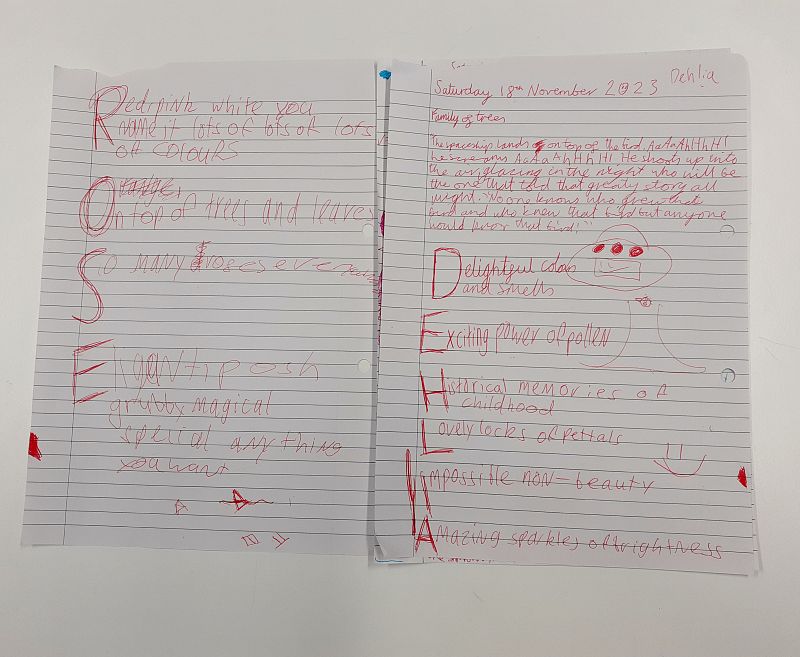
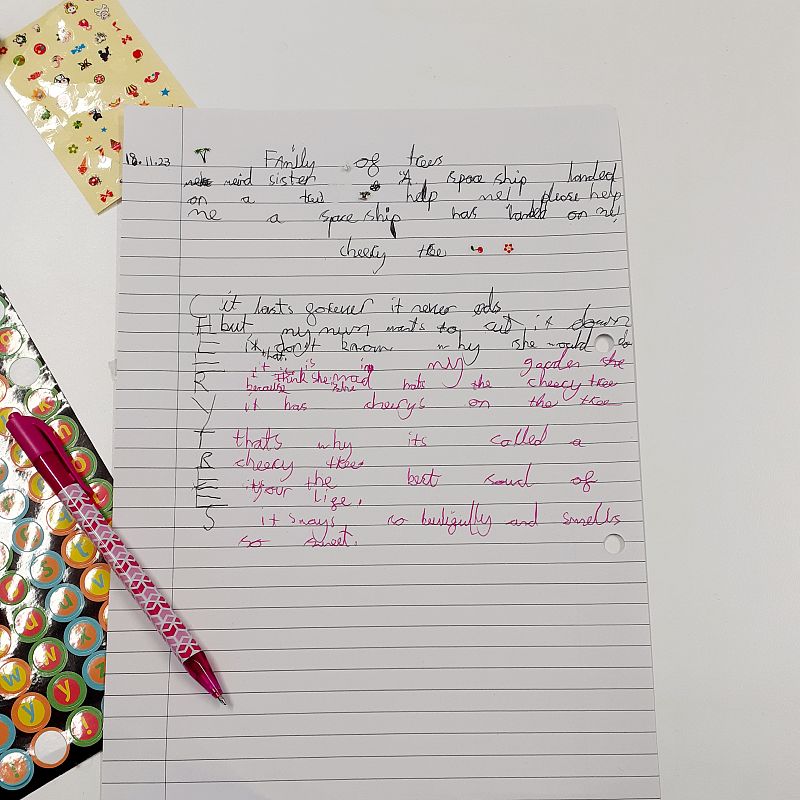
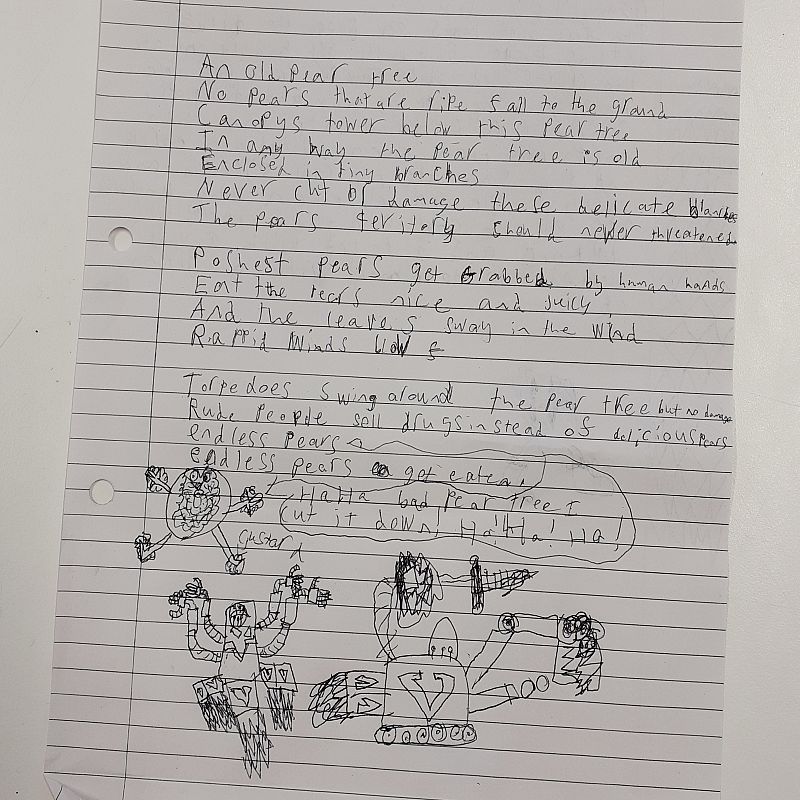
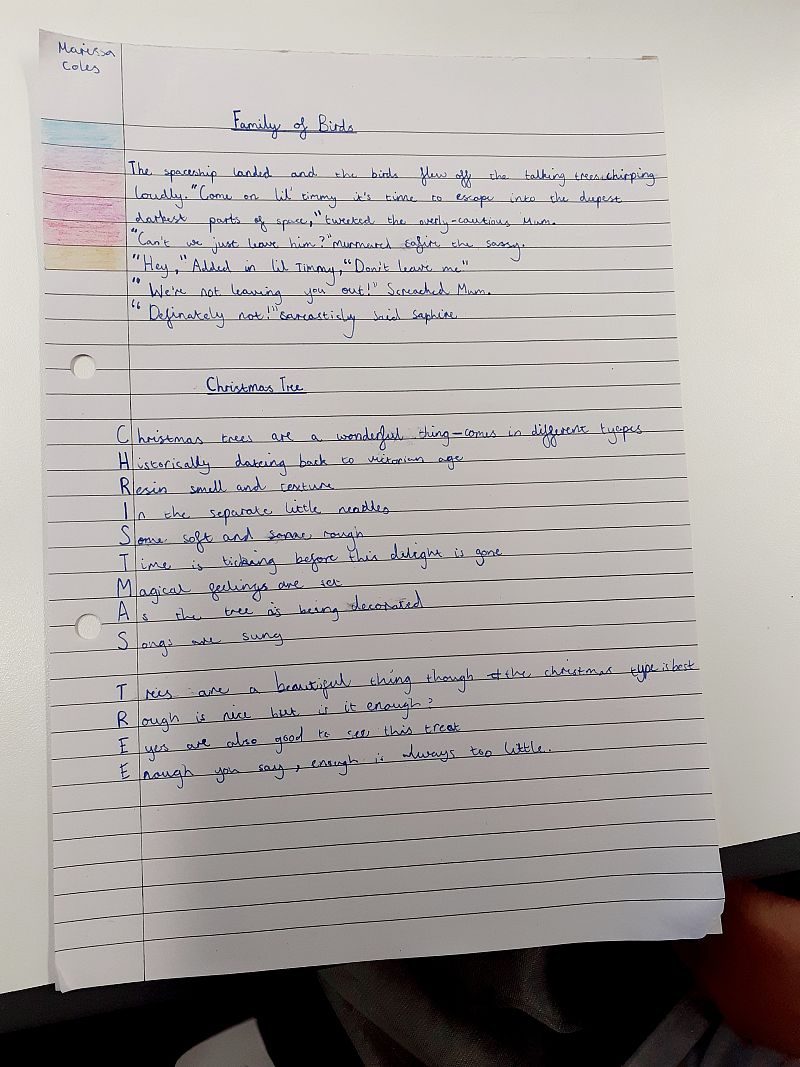
Archive
Junior & Young Writers Week 3: Return From The Magical World
Junior & Young Writers Week 2: African Mythology
Problems, Problems, Problems...
Cautionary Tales & Christmassy Opening Lines
You've Gotta Have Pace, Pace, Pace
Junior & Young Writers Week 1: Alien Encounters
Junior & Young Writers: Week 5 - Play on Words Pt. 2
Junior & Young Writers: Week 11 - end of term showcase [build a bard workshop]
Junior & Young Writers: Week 10 - Greek Theatre - chorus stories
Junior & Young Writers: Week 9 - Greek Origin Stories - Spring
Rubber Ducks & Writing Festivals
Junior & Young Writers: Week 7 - Greek Hero Stories [the 12 labours of Hercules]
Junior & Young Writers: Week 12 [Wild Words] - Stuff & Things
Junior & Young Writers: Week 11 [Wild Words] - World Building 2
Junior & Young Writers: Week 10 [Wild Words] - World Building
Junior & Young Writers: Week 9 [Wild Words] - Mystery & Choose Your Own Adventure
Junior & Young Writers: Week 8 [Wild Words] - Spooky Sequels & Potion Poems
Junior & Young Writers – Week 10 (Writers’ Inspiration) – Final Showcase
Junior & Young Writers – Week 9 (Writers’ Inspiration) – Editing & Performance Tips
Junior & Young Writers – Week 8 (Writers’ Inspiration) – Cuteness
Time goes on by Tavinder Kaur New
Junior & Young Writers – Week 7 (Writers’ Inspiration) – Natural Solutions
Junior & Young Writers – Week 6 (Writers’ Inspiration) – The Language of Fruit and Veg
Junior & Young Writers – Week 5 (Writers’ Inspiration) – Adventures In Space
Tinklebobs and Bedraggled Angles
Junior & Young Writers – Week 4 (Writers’ Inspiration) – Our Environment
Fortune Tellers & Future Letters
Junior & Young Writers – Week 3 (Writers’ Inspiration) – Home
Young Writers - Week 10 (The Art of Writing) – Final Week Showcase
Junior Writers - Week 10 (The Art of Writing) – Final Week Showcase
Young Writers – Week 9 (The Art of Writing) – Choose Your Own Adventure
Junior Writers – Week 9 (The Art of Writing) – Choose Your Own Adventure
Young Writers – Week 8 (The Art of Writing) – Sequel Stories
Junior Writers – Week 8 (The Art of Writing) – Sequel Stories
Young Writers – Week 7 (The Art of Writing) – Picture Prompts
Junior Writers – Week 7 (The Art of Writing) – Picture Prompts
Young Writers - Week 6 (The Art of Writing) - Script-writing & Dialogue
Junior Writers - Week 6 (The Art of Writing) - Script-writing & Dialogue
Junior Writers – Week 5 (The Art of Writing) – Poetry
Young Writers - Week 5 (The Art of Writing) - Poetry Potions
Edward The Martyr - A Competition!
Mood Boards and Postcards from Space
Young Writers - Week 3 (The Art of Writing) - PLOT
Junior Writers - Week 3 (The Art of Writing) - PLOT
Moomin Stories and Hollywood Pitches
Young Writers - Week 2 (The Art of Writing) - Genre & Setting
Junior Writers - Week 2 (The Art of Writing) - Genre & Setting
Prompts, Dialogues, and Cliché
Story Structure Part One: Exposition and Beyond...
Young Writers - Week 1 (The Art of Writing) - Character
Junior Writers - Week 1 (The Art of Writing) - Character
Young Writers - week 4 - Nature Writing [animals & wildlife]
Junior Writers - week 4 - Nature Writing [animals & wildlife]
Young Writers - week 3 - Nature Writing [trees/plants/flowers]
Junior Writers - week 3 - Nature Writing [trees/plants/flowers]
Young Writers - week 2 - 'fractured fairy tales'
Junior Writers - week 2 - 'fractured fairy tales'
Young Writers - week 1 - 'from deep inside a forest'
Creating Communities through Writing
WORDCUP - Hounsdown Session #6
Making pillows in a house full of feathers
WORDCUP - Hounsdown Session #5
Exploring home – a place, person, house
WORDCUP - Hounsdown Session #4
Stories From Our Streets at the Abbeyfield Wessex Society Reminiscence Session at Poole Library
What Do You Really Mean? Writing Dialogue for Scripts
WORDCUP - Hounsdown Session #3
Character Building & Murder Mysteries
Going inside – from a spark to a story
WORDCUP - Hounsdown Session #2
Maybe I Can Be Invisible After All... Monologues
Creative Writing: Fun Facts, Diverse Voices and Different Perspectives
Writing Competition - Stories From Our Streets
Stories From Our Streets Community Activity Pack
Thinking in-quiet, after the fire
Found Cities, Lost Objects: Women in the City Curated by Lubaina Himid CBE
Ekphrastic Jukebox - Writing to Music
ArtfulScribe LitFest Community Showcase 2023
Young writers exercise their creative power
Writing to The Sorcerer's Apprentice
The Mousetrap - Mayflower Young and Junior Writers Investigate Mystery!
Stories From Our Streets Launch!
Interview: In Conversation with Dr Victoria Leslie
The Missing Farmer/ Blackout Poetry & DADA
Exploring this wonderful World
Using props to create characters/ working as a writing room
Stories of the Dust and Character Questions
Storytelling and Escalation or Rising Action
Junior Writers Club Acrostic Poem
Notes on Intention for MAST Collective - Year 3 - Facilitation Focus
Earthquakes & Dominoes - MAST Collective Blog #4
SUPER MARIO AND POP CULTURE POEMS
Receptionists & Inky Voids - MAST Collective Blog #3
Saying No and saying YES on National Poetry Day!
There's a Dragon in the Wardrobe...
House Warming Party (The Mortifying Ordeal of Being Known) - MAST Collective Blog #2
Intern Blog 5 - The Publishing Process
POEMS TO SOLVE THE CLIMATE CRISIS
On The Streets With Theresa Lola
Intern Blog 4 - The Internship Journey
NEW DIRECTIONS, STARTING SMALL - THE ORWELL YOUTH PRIZE
LIGHTHOUSES, HOPE AND METAPHORS
on workshop and transformations: frogs, lions, and the duck that becomes a larder...
Poetry Ambassadors - Interview with April Egan
Intern Blog 1 - Finding a Voice
World Poetry Day: Fluffypunk and the Invisible Women
On Being a Writer: A Conversation by Beth Phillips & Sam Morton
Poetry Ambassadors - Interview with Kaycee Hill
UNHEARD VOICES: INTERNATIONAL WOMEN'S DAY, AND STORIES OF CONFLICT













